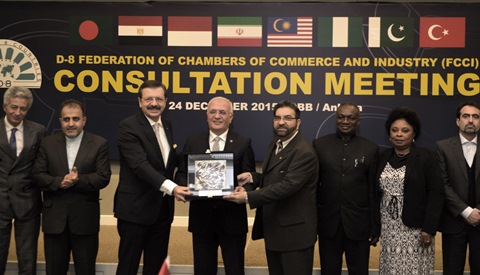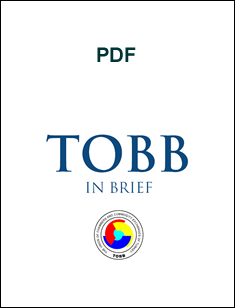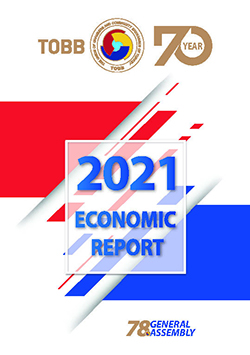Increased trade between D-8 countries will boost Islamic countries

24.12.2015 / Ankara
Speaking at the meeting of the D-8 countries’ chambers of commerce and industry, TOBB President M. Rifat Hisarcıklıoğlu said, “We must lead the way in regards to issues such as the Preferential Trade Agreement, Joint Arbitration, Visas, development of trade corridors as high-capacity countries. Increasing our intragroup trade and economic relations will also provide a boost to Islamic countries.”
D-8 member countries’ chambers of commerce and industry D-8 Federation of Chambers of Commerce and Industry (FCCI) Consultation Meeting was hosted by TOBB President M. Rifat Hisarcıklıoğlu at the TOBB Twin Towers and attended by Economy Minister Mustafa Elitaş.
In his opening speech, TOBB President Hisarcıklıoğlu stated that the D-8’s goal has been to synergize the 8 countries which boast a combined population of approximately a billion with 3.7 trillion USD combined national income in order to increase their prosperity.
Stating that D-8 countries are also members of the Organization of the Islamic Cooperation, the TOBB President emphasized the importance of these 8 countries as a dynamo for the Islamic countries in general with the scale of their trade and production.
- D-8 lacking in economic cooperation and interpersonal relations
Stating that D-8 countries only conduct 7% of their total international trade among themselves, Hisarcıklıoğlu stressed the importance of interpersonal relations among the citizens of D-8 countries. Underlining the fact that D-8 is lacking strength in the areas of economic cooperation and interpersonal relations, Hisarcıklıoğlu stated that without economic cooperation and power it is impossible to have a say in the international arena.
- Private sector suggestions should be voiced
Hisarcıklıoğlu, in regards to the development of economic cooperation, stated that the private sector has a duty to present its suggestions for solutions to the problems encountered in the matter.
Stating that tangible projects and suggestions, presented to the government and backed by lobbies will have the power to move governments, Hisarcıklıoğlu also stressed the importance of supporting entrepreneurship as well as the inclusion of women and youth in the economy.
- Economy Minister Elitaş
Economy Minister Mustafa Elitaş stated that despite good relations among D-8 countries, it is evident that there are certain inner dynamics which are lacking in power such as the ratio of intragroup trade increase percentage compared to that of global trade and the share of the global economy held by D-8 when comparing the figures between 1997 and 2014.
Stressing the need for cooperation and determination in solving these issues, Elitaş said, “This is the first step, first action to build on in order to have a better year in 2016.
- D-8 Secretary General Seyet Ali Muhammed Musavi
D-8 Secretary General Seyet Ali Muhammed Musavi emphasized the importance of the private sector’s role in increasing the trade volume within D-8.
Recognizing the various problems encountered by D-8 throughout the process of developing economic cooperation among its members, Musavi stressed the importance of engendering cooperation between the private sector and the government.
President of the Pakistani Federation of Commerce and Industry, Mian Muhammed Adrees stated that the bilateral trade volume of the D-8, as well as its human resources is miniscule when compared to the full potential it holds. Adrees underlined the importance of increasing regional trade and taking on a more prominent role in the global market.
Following the speeches, Economy Minister Elitaş, TOBB President Hisarcıklıoğlu and the representatives of the D-8 countries posed for photographs.
- D-8 Countries
Known as the 8 developing countries, D-8, is comprised of Turkey, Iran, Pakistan, Bangladesh, Malaysia, Indonesia, Egypt and Nigeria. Formally established at the summit held in İstanbul in 1997, D-8 works to better the position of developing countries in the global economy, to diversify their trade relations and create new opportunities within its member countries while working to provide a strong presence in international decision-making mechanisms as well as increasing the prosperity of peoples.
Your message has been sent
Thank you |




